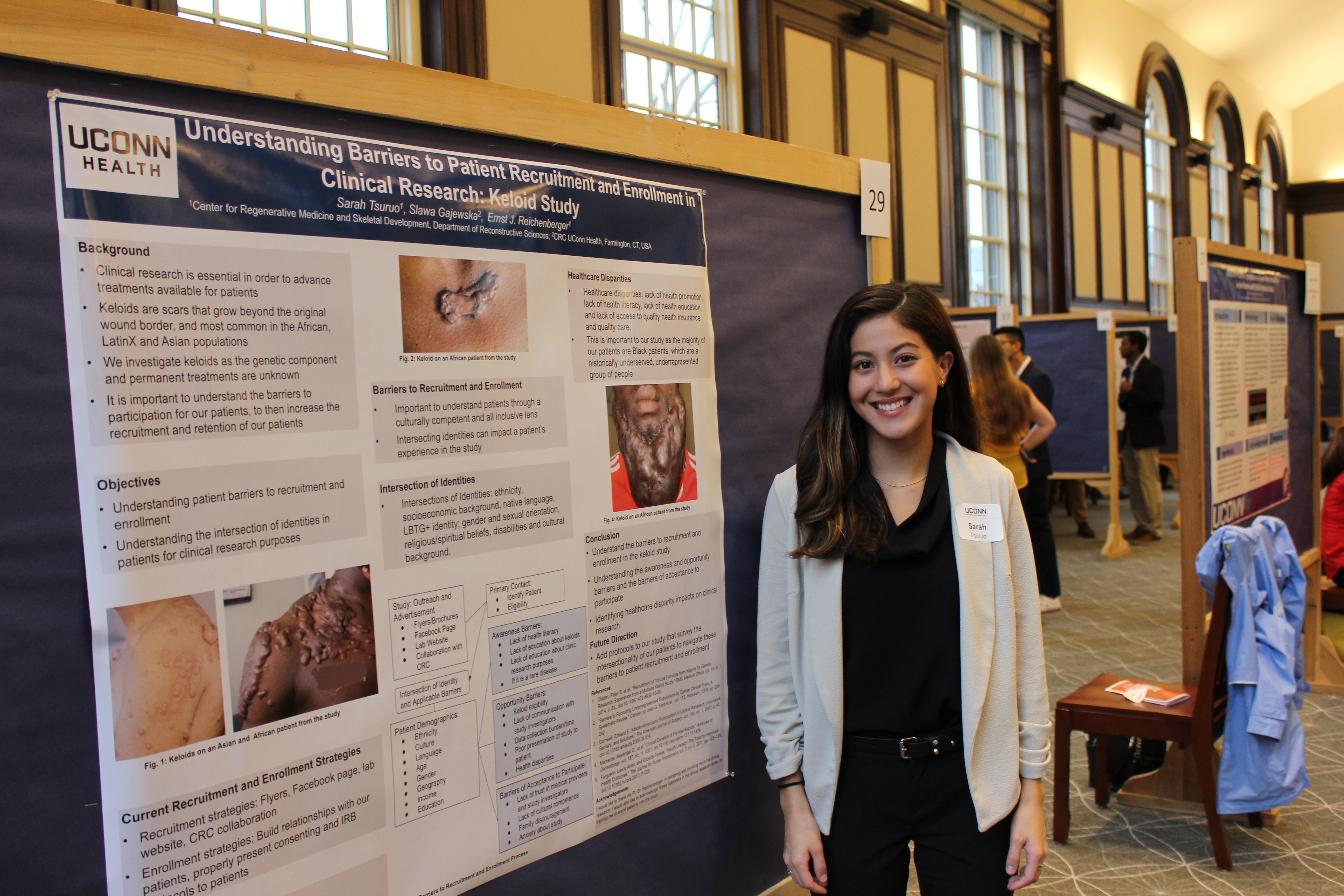Sarah Tsuruo came to the University of Connecticut knowing she was interested in biology, citing the positive influence of her high school science teachers. At UConn, she has turned that interest into a productive undergraduate research career.
Tsuruo is a biological sciences major with a double minor in molecular and cell biology and women’s, gender and sexuality studies (WGSS). Tsuruo believes her WGSS minor helps inform her understanding of the biology field.
“I love talking about the different intersections that no one talks about in biology,” Tsuruo says.
Tsuruo knew she wanted to do research as an undergraduate and reached out to professors whose work aligned with her interests, including professor Daniel Bolnick in the Department of Ecology and Evolutionary Biology (EEB).
“When everything matched up, I was really excited to join his lab,” Tsuruo says. “So here I am three years later.”
In Bolnick’s lab, Tsuruo studies the interplay between the immune and endocrine systems, which led to a Summer Undergraduate Research Fund (SURF) award from UConn’s Office of Undergraduate Research this past summer. Tsuruo continues to explore how a fibrosis immune response affects sex hormones in stickleback fish.
As someone who wants to pursue a career in medicine, Tsuruo is interested in how these sex-specific immune differences can be translated to humans.
“I think the evolutionary and ecology aspects of my EEB lab provides a more holistic picture of health and how that translates to humans,” Tsuruo says.
Tsuruo credits Bolnick with helping her understand the work when she first started.
“He’s a really incredible mentor who takes the time to break things down,” Tsuruo says.
For Tsuruo, this patience and close mentoring is one of the things that prevented her from becoming discouraged and helped her learn about research.
“In STEM fields, a lot of undergraduates may be unsupported by the higher ups in the field, so it’s great to have a mentor who walks you through it,” Tsuruo says.
Tsuruo also worked at UConn Health as a clinical research intern with professor Ernst Reichenberger, where she researched quality-of-life measures for keloid patients who suffer from abnormal, tumor-like growths on otherwise healthy skin.
“Having the ability to bring a new topic into the research field I’m working in and bringing more intersectionality is really exciting,” Tsuruo says.
Tsuruo’s ability to bridge fields and topics is also evident in her work in the community. Through a Change Grant, Tsuruo developed a trauma-informed STEM curriculum for children in a domestic violence shelter this past summer. These children often have different classroom needs from those who have not experienced that kind of trauma. She says she was inspired to take on this challenge thanks to her experiences as a WGSS minor and STEM mentor at UConn’s Community Outreach 4H Vernon.
“We have to understand how to interact with these kids as appropriate for what they’ve been through in the way that’s going to help them be the best they can be,” Tsuruo says.
The curriculum included a focus on fostering connections between children to form a support network.
“It’s really useful for these kids to be accepted as they are,” she says.
Tsuruo is currently working on her honors thesis where she devised her own question and is performing this independent project in Bolnick’s lab.
Tsuruo is looking at the interaction between sex hormones and the immune system. She hopes to discover what tradeoffs organisms make in this interaction in order to optimize survival.
While research can be a challenging puzzle at times, Tsuruo says the end results make the effort worth it.
“Once you finally get it, it’s so rewarding to complete work that is significant and is leading to something,” Tsuruo observes.
After graduating from UConn, Tsuruo plans to go to medical school to become a pediatrician or OB-GYN. She intends to continue to incorporate research into her career with a special focus on the social determinants of health.
“I think research is very important to my career,” Tsuruo says.
Tsuruo recommends undergraduates interested in joining a lab take the time to find one that aligns with their interests.
“It’s really important to give yourself the confidence you need to pick something that fits your goals,” Tsuruo says.
One thing Tsuruo has learned from her experiences at UConn is that research calls for determination.
“You need to be a quick thinker, resolve problems, and keep working on it,” Tsuruo says.
Students interested in learning more about research opportunities at UConn can check out virtual events during the Month of Discovery.



